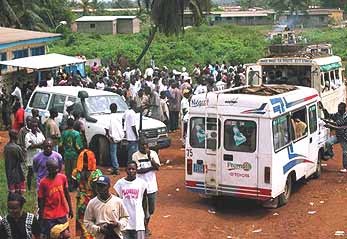UNHCR temporarily suspends operations in Côte d'Ivoire
UNHCR temporarily suspends operations in Côte d'Ivoire

ABIDJAN, Côte d'Ivoire, Jan 28 (UNHCR) - Security concerns in Côte d'Ivoire have forced the UN refugee agency to temporarily suspend its operations in the strife-torn country, including a repatriation movement that has so far sent some 900 Liberians home from the south-west.
In view of recent violent protests in the Ivorian city of Abidjan and the general climate of insecurity, UNHCR has put all its operations in the country on hold as a precautionary measure, instructing its staff to stay at home until further notice.
The emergency repatriation of Liberian refugees from Tabou in south-western Côte d'Ivoire has also been suspended. As of last Saturday, when the return convoys by bus and boat were stopped, some 900 Liberians had been sent home across the Cavaly river. Arriving in Harper, in Liberia's Mariland county, they were taken to a transit camp where they received UNHCR assistance.
Last week, a delegation of tribal chiefs from Liberia embarked on a mission with their counterparts in Côte d'Ivoire to negotiate for the free passage of homeward-bound Liberians. Many of the refugees who had managed to cross the border into Liberia reported being harassed along the way.
Despite the temporary suspension, Liberians in the area are still coming forward to register with UNHCR for help to return home. The refugee agency is working to accommodate them in a rehabilitated transit centre in Tabou until the return convoys start again.
Meanwhile, the spontaneous exodus from Côte d'Ivoire continues. More than 71,000 people have fled rebel fighting in the west since mid-November, making their own way into Liberia. These include over 40,000 Liberians, 25,000 Ivorians and nearly 6,000 other nationals.
UNHCR estimates that up to 40,000 Liberian refugees still remain in the volatile western region of Côte d'Ivoire, including more than 5,000 in Nicla camp who cannot return home due to their ethnic background and known opposition to the Liberian government.
Concluding her mission to the West Africa region last Saturday, UNHCR's Deputy High Commissioner Mary Ann Wyrsch said that the agency had so far received little regional assistance in finding other solutions, such as alternative sites in the region for Liberian refugees stranded in western Côte d'Ivoire.
"It is sad that refugees are choosing to return because of fear for their safety. Countries that signed the refugee Convention should not forget their obligations to care for refugees," she said in Abidjan. "UNHCR cannot do the job alone. One has to remember that on the other side of the border [in Liberia], UNHCR teams are also assisting distressed Ivorians fleeing the conflict on a daily basis."
Wyrsch expressed her concern that even vulnerable refugees have become targets in Côte d'Ivoire, where, until recently, they were welcome members of the local community. "It is the responsibility of the Ivorian government to protect them as well," she said. "I appeal to the Ivorian people to make the distinction between refugees and rebels. Refugees are vulnerable and in need of help."
In a repeated call, the Deputy High Commissioner also urged both the loyalist and rebel forces to stop recruiting refugees, as has been reported since the early days of the Ivorian conflict. "It will be difficult for a refugee to refuse [a request to fight] as he will always feel he has to prove his loyalty. I have conveyed this message during my meetings with government officials and I appeal to the other side as well - refugees have fled a conflict at home, they should be protected, not included in another war."








